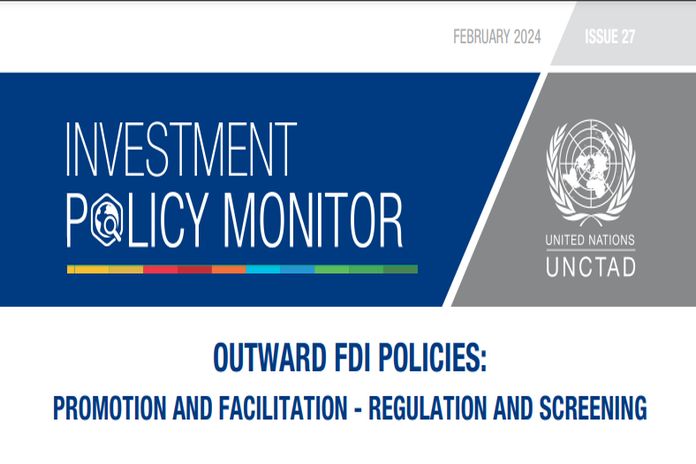GENEVA, Switzerland – UNCTAD has released its latest Investment Policy Monitor (No. 27). It discusses trends in outward foreign direct investment (OFDI) policies.
Overall, the Monitor shows that policies to facilitate outward FDI are becoming more widespread, but so are policies that restrict outward FDI. The number of countries that facilitate outward investment to promote sustainable development is still limited.
Highlights include:
- OFDI promotion initiatives are common among developed countries, present in 79 per cent of them, reflecting their role as traditional sources of FDI. Support for companies that invest abroad typically serves two main objectives. First, the growth and internationalization of domestic businesses, particularly SMEs. Second, the promotion of international cooperation and development efforts.
- An increasing number of developing countries are also supporting their firms in investing overseas (14 per cent), in line with their expanding role as sources of FDI. Supporting the internationalization of domestic firms and securing access to new markets, resources and technologies are the main objectives of these policies.
- Sustainability considerations and the potential benefits to the host country’s development increasingly feature among the qualifying criteria for OFDI policy support, particularly among developed countries. However, despite international commitments in the context of the SDGs, only 18 developed and 5 developing economies have adopted OFDI promotion schemes targeted at promoting investment specifically in developing countries.
- Nearly half of the world’s economies impose restrictions on OFDI, including most developing countries and least developed countries (LDCs). In these countries, restrictions traditionally aim at preventing balance of payment difficulties and to ensure that investments abroad do not adversely affect the home country’s economic priorities.
- OFDI restrictions have surged across economies at all levels of development in the last decade. Efforts to comply with anti-money laundering standards and concerns over the potential national and economic security risks posed by OFDI contributed to the rise.
- As OFDI restrictions become more widespread, the complexity of applicable rules and regulatory discretion may reduce predictability and increase the administrative burden for home country authorities and investors.
The next update on investment policy trends will be included in UNCTAD’s World Investment Report 2024, scheduled for publication in June.
Conclusion
This Investment Policy Monitor finds that, mirroring the situation of inward FDI policies, policies on outward investment promotion and regulation are increasingly influenced by sustainability considerations, geopolitical tensions and national security concerns.
OFDI promotion policies, particularly those adopted by developed countries, increasingly focus on sustainability criteria and on supporting the SDGs. However, the number of countries that actively promote OFDI to developing countries or that condition OFDI support on sustainability criteria remains limited. This highlights an opportunity for countries to expand OFDI programmes that support international development by encouraging and facilitating their domestic enterprises to engage in overseas investments that contribute to sustainable development in the countries that need it the most.
At the same time, OFDI restrictions are on the rise and increasingly focus on national security concerns. The current discussions on the adoption or reinforcement of national security mechanisms governing OFDI in key investor countries represent a turning point in the global OFDI landscape. While the implementation of these regulatory changes may take time, their adoption could prompt more countries to consider similar measures.
As in the case of inward FDI screening, the challenge posed by these new regulations lies in establishing a well-balanced framework capable of responding effectively to the potential risks posed by outward investments to national security, without unnecessarily limiting OFDI and its benefits for both the home and host country.
As regimes to monitor and regulate outward investment become more widespread, issues related to the complexity of applicable rules, the potentially wide margin of regulatory discretion and the lack of predictability they generate may become significant barriers to investment and represent an increasing administrative burden for home country authorities and investors. Predictability, transparency and administrative efficiency should be the core principles in guiding the adoption of these schemes.





